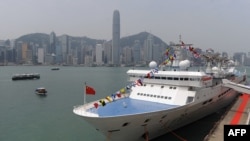Sri Lanka has asked China to defer the planned visit of a Chinese satellite tracking ship that has raised security concerns in India.
Controversy over the ship’s planned arrival close to Indian shores erupted late last month after New Delhi said that it carefully monitors developments affecting its economic and security interests with reference to the Chinese ship.
Sri Lanka’s Foreign Ministry said in a statement Monday that the Yuan Wang 5 was given permission last month to dock at the port of Hambantota Thursday through August 17 for replenishment. But “subsequently in light of the need for further consultations,” it has asked China to postpone the visit. It did not cite a reason for doing so.
The Yuan Wang 5 is described as a research and survey vessel, according to analytics website MarineTraffic. Security analysts say that that the ship is also packed with sophisticated systems to monitor satellite, rocket and missile launches.
“It is loaded with very advanced sensors that can be used for surveillance,” said defense analyst Rahul Bedi in New Delhi.
Responding to reports that Colombo has deferred the ship’s visit, Beijing’s Foreign Ministry spokesman, Wang Wenbin, said Monday, “It is completely unjustified for certain countries to cite the so-called “security concerns” to pressure Sri Lanka.”
Without mentioning India, he said that it was “morally irresponsible” to exploit Sri Lanka’s vulnerabilities when it is dealing with an economic crisis and urged “relevant parties to see China’s marine scientific research activities in a rational light and stop disrupting normal exchange between China and Sri Lanka.”
The controversy underlines the diplomatic dilemma Sri Lanka faces in balancing ties with the rival Asian giants, whose help the tiny country needs to tide over an economic crisis.
Beijing’s expanding footprint in Sri Lanka over the last 15 years has long caused unease in India. In particular, New Delhi fears that the Chinese-built port of Hambantota could be used by Beijing as a strategic berth in the Indian Ocean. In 2017, Colombo leased the port to China for 99 years after it was unable to pay back its debt.
The port is among several infrastructure projects built by Beijing in Sri Lanka over the last decade, including railways and roads.
Over the last six months, as Sri Lanka battled it worst economic crisis and faces virtual bankruptcy, New Delhi reached out to help its neighbor, providing credit lines of $4 billion and crucial assistance that includes food, fuel, medicine and cooking gas. Analysts see it as an effort to build goodwill and recover some of the influence that India had lost in the country that is strategically located on its southern tip along busy shipping lanes.
As Sri Lanka negotiates with the International Monetary Fund for a bailout, it will also need to bring China on board for restructuring the roughly $5 billon debt it owes to Beijing.
For the time being, Sri Lanka appears to have bowed to Indian pressure, according to Paikiasothy Saravanamuttu, executive director of the Center for Policy Alternatives in Colombo. “I think we are just praying for time to cool off the tensions because the Chinese also will not want to be seen as backing down.”
Colombo will need deft diplomacy to manage its ties with the two powers, whose relations have deteriorated in the past two years amid a military standoff in the Himalayan mountains. “Sri Lanka will have to avoid a situation where the two countries see their ties with Colombo as a zero-sum game – either you are pro-Indian or you are pro-Chinese,” according to Saravanamuttu.




